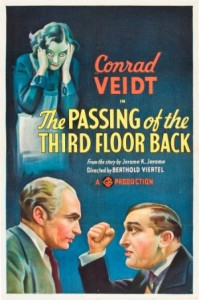My bride and I don’t think of ourselves as old. (Well, not old old.) I run around with athletic teens and 20-somethings, and that can make me feel a tad creaky and lardaceous by comparison, but still. We did celebrate (and celebrate) a significant anniversary last month, which compels us to accept that, while we can still find some giddy in our good coupling luck, we’re not exactly newlyweds. We felt like it at certain August moments, which for me was like dozens of non-fattening banana splits in one hand-delivered magic box.
Days back, during my ongoing organizing and an attempted material purge, I ran across the quote below from writer Jerome K. Jerome. I had long ago photocopied it (and its accompanying sentimental snapshot of an elderly couple) from somewhere onto coloured sheets of paper I used to use for something that we dinosaurs used to call “letter writing”. I have a whole stack of them. It makes me want to write letters to people! (Confession: I even have stamps.) With a little new-fashioned research, I easily found that Jerome’s comments on love and marriage – I hadn’t known the source – came from an early 20th-century play of his.
It’s the sort of play whose subtitle has a subtitle, whose dramatis personae includes “Mrs. Sharpe”, “Miss Kite”, “Mrs. Tompkins”, and The Major (“Troublesome creatures, these girls! Troublesome creatures!”). There is a mysterious Stranger, who quickly becomes everyone’s confidante. A young man is described as a “cheerful bounder” – now there’s a word we’ve lost, if we ever really had it in the Colonies – and another is said to speak with “gallant jauntiness”. (Jaunty! Don’t you think we should be, in general, more — and more frequently — jaunty?)
Enough preamble to the prologue: the Stranger, having observed youthful passion and staid marital coupling, is speaking to Mrs. Tompkins about “Darby and Joan”, and makes a statement that I’ve found beautifully applicable to good old marriages I have known. It may even someday apply to my bride and me – if we ever get old, that is!
“Nothing, it seems to me, is more beautiful than the love that has weathered the storms of life. The blossom that flowers in the heart of the young, as in those days when first you met him, so handsome, so kind, you remember? That, too, is beautiful, the love of the young for the young. It is the beginning of life. But the love of the, forgive me, of the old for the old, that is the beginning of – things longer.”
Jerome Klapka Jerome (1859-1927) was an English writer, best known for a comic novel called Three Men in a Boat (1889). (I’m not sure I’d ever heard of it, either. But on the same day I found where this quote came from, I found The Guardian newspaper’s Best 100 Novels List by Robert McCrum from last June, and there was JKJ and his 3MiaB. It may be a biased list – what subjective ranking isn’t? – as it skews heavily toward the UK and to the famous classics. Still, there was Mr. Jerome again. Serendipity!)
This rather famous statement by The Stranger comes from what is now surely a nearly unknown play. The Passing of the Third Floor Back: An Idle Fancy (In a Prologue, a Play and an Epilogue) was first produced in 1908, and is in a more serious vein than Three Men. It was a big hit on Broadway and especially in London, and was twice made into British films, one silent and one talkie. (It was hailed as the fourth best in 1935.) So there.


Love this quote, lovely to know where it comes from! My neighbours were elderly, and after she suffered a stroke, he cared for her for nearly 15 years, renovating the house to enable her to remain at home. (The renovations in the late 90s cost more than the purchase of the house in the 60s.) This was the love story I held out to my kids whenever they started talking Disney movies. So real, so weathered, so beautiful.